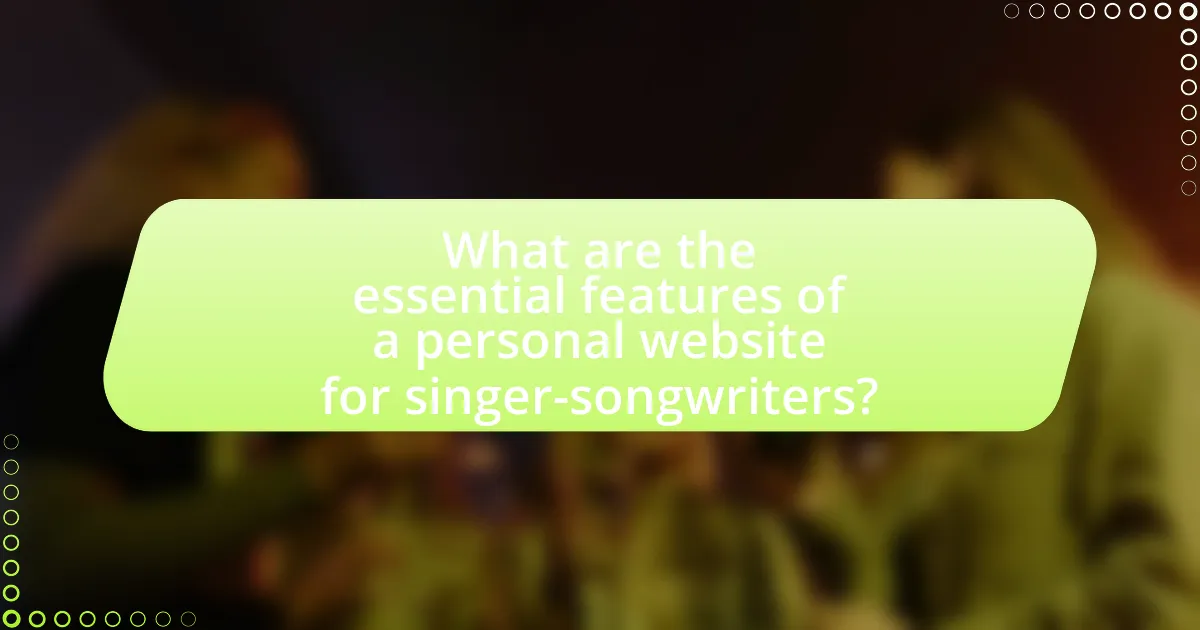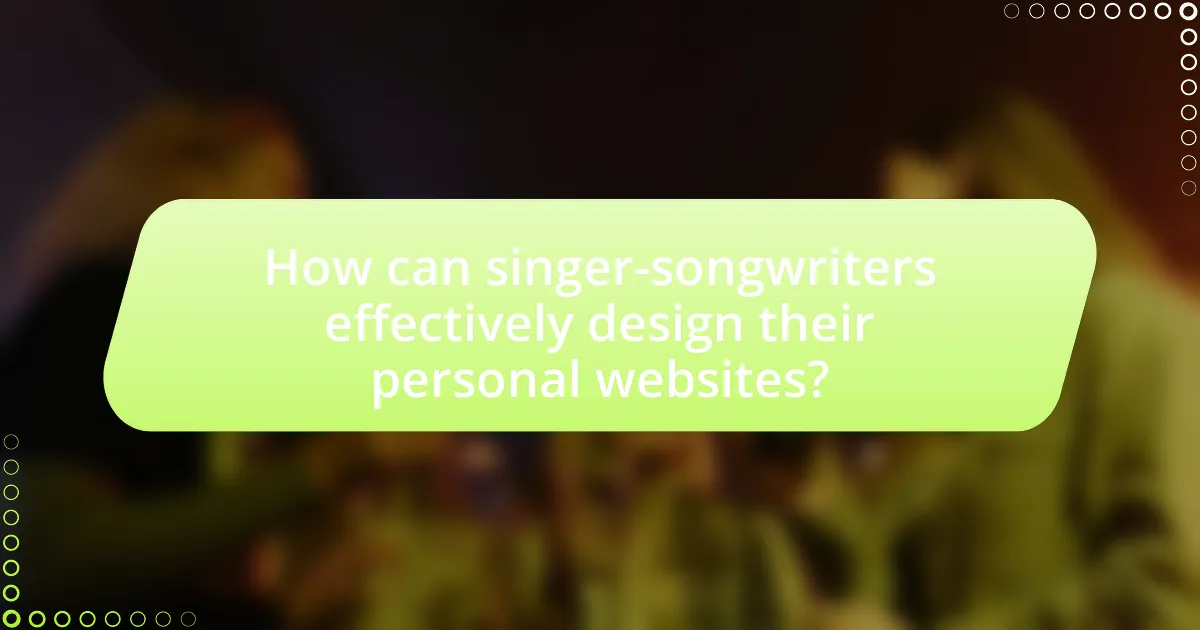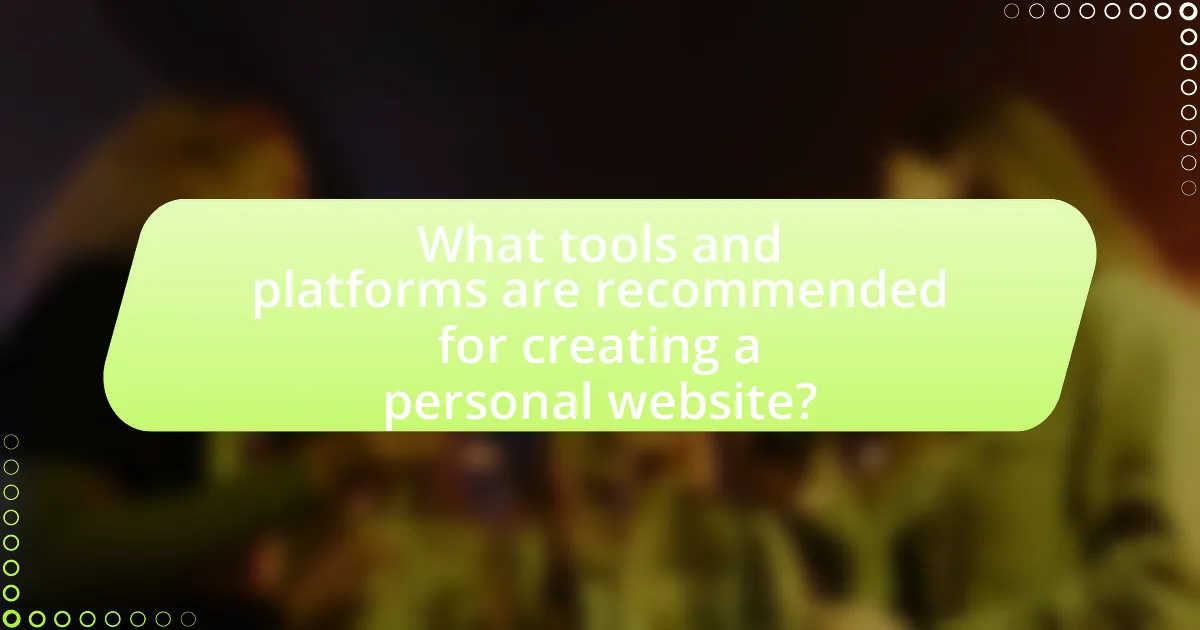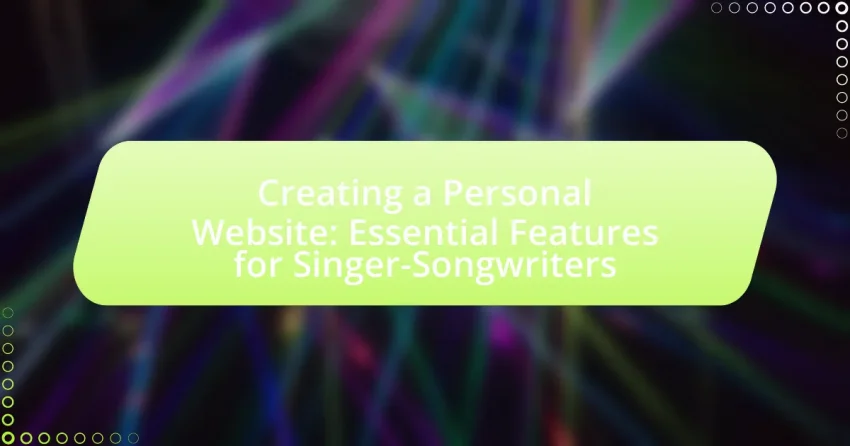Creating a personal website is essential for singer-songwriters to effectively showcase their music and connect with their audience. Key features include a music player, biography, discography, contact form, and social media links, all of which enhance user engagement and promote the artist’s brand. The article explores how a personal website can elevate a singer-songwriter’s career by serving as a central hub for their work, improving search engine visibility, and fostering audience interaction. Additionally, it discusses design principles, content strategies, and SEO techniques that can optimize a website’s performance and user experience, ultimately contributing to the artist’s success in the competitive music industry.

What are the essential features of a personal website for singer-songwriters?
A personal website for singer-songwriters should include essential features such as a music player, a biography section, a discography, a contact form, and links to social media. The music player allows visitors to listen to tracks directly on the site, enhancing engagement. A biography section provides background information, helping fans connect with the artist. The discography showcases released works, which is crucial for promoting music. A contact form enables booking inquiries and fan interactions, while social media links facilitate broader audience reach and engagement. These features collectively create a comprehensive platform for singer-songwriters to present their work and connect with their audience effectively.
How can a personal website enhance a singer-songwriter’s career?
A personal website can significantly enhance a singer-songwriter’s career by serving as a central hub for their music, brand, and audience engagement. It allows the artist to showcase their portfolio, including music tracks, videos, and upcoming events, which can attract new fans and industry professionals. Additionally, a personal website provides control over the narrative and presentation of their work, enabling the singer-songwriter to communicate directly with their audience without relying on social media algorithms.
Statistics show that artists with a dedicated website are perceived as more professional, which can lead to increased opportunities for gigs and collaborations. Furthermore, a personal website can improve search engine visibility, making it easier for potential fans and industry contacts to discover the artist’s work. This direct access to content and information fosters a stronger connection with fans, ultimately contributing to the growth of the singer-songwriter’s career.
What role does a personal brand play in a singer-songwriter’s website?
A personal brand plays a crucial role in a singer-songwriter’s website by establishing their unique identity and connecting with their audience. This identity helps differentiate the artist in a competitive music industry, allowing fans to relate to their story, style, and values. A well-defined personal brand can enhance engagement, as it fosters a sense of authenticity and trust, which are essential for building a loyal fan base. For instance, artists like Taylor Swift and Ed Sheeran effectively use their personal brands to create a strong online presence, leading to increased sales and streaming numbers.
How does a personal website help in audience engagement?
A personal website enhances audience engagement by providing a dedicated platform for direct interaction and content sharing. This allows singer-songwriters to showcase their music, share updates, and connect with fans through features like blogs, social media integration, and contact forms. Research indicates that websites with interactive elements can increase user engagement by up to 70%, as they encourage visitors to spend more time exploring content and participating in discussions.
What key elements should be included in a singer-songwriter’s personal website?
A singer-songwriter’s personal website should include a homepage, music samples, a biography, a tour schedule, a contact page, and links to social media. The homepage serves as the entry point, showcasing the artist’s brand and latest updates. Music samples allow visitors to listen to the artist’s work, which is crucial for engagement. A biography provides background information, helping fans connect with the artist’s story. A tour schedule informs fans about upcoming performances, enhancing attendance. The contact page facilitates communication for bookings and inquiries. Finally, social media links encourage further interaction and community building. These elements collectively create a comprehensive platform for the artist’s online presence.
What types of content are most effective for showcasing music?
The most effective types of content for showcasing music include audio tracks, music videos, live performance recordings, and behind-the-scenes content. Audio tracks allow listeners to experience the music directly, while music videos enhance engagement through visual storytelling. Live performance recordings capture the energy of concerts, providing an authentic experience. Behind-the-scenes content offers fans a glimpse into the creative process, fostering a deeper connection. These content types are proven to attract and retain audience attention, as studies show that multimedia content increases user engagement by up to 80%.
How can a biography section enhance a singer-songwriter’s image?
A biography section can enhance a singer-songwriter’s image by providing a narrative that connects their personal story to their music. This connection fosters authenticity, allowing fans to relate to the artist on a deeper level. For instance, a well-crafted biography can highlight significant life experiences, influences, and milestones that shaped the artist’s musical journey, thereby creating a compelling persona. Research indicates that artists who share personal stories tend to engage audiences more effectively, as emotional connections can lead to increased loyalty and support.

How can singer-songwriters effectively design their personal websites?
Singer-songwriters can effectively design their personal websites by focusing on user-friendly navigation, showcasing their music prominently, and integrating social media links. User-friendly navigation ensures that visitors can easily find information about the artist, such as biography, discography, and upcoming events. Prominently showcasing music, such as embedding audio players or linking to streaming platforms, allows fans to engage with the artist’s work immediately. Integrating social media links facilitates connection with fans and encourages sharing, which can enhance visibility. According to a study by the Pew Research Center, 72% of adults use social media, highlighting its importance for artist promotion.
What design principles should be followed for a musician’s website?
A musician’s website should prioritize user experience, visual appeal, and functionality. User experience can be enhanced through intuitive navigation, ensuring visitors can easily find music, tour dates, and contact information. Visual appeal is crucial; a cohesive color scheme and high-quality images can effectively represent the musician’s brand. Functionality includes mobile responsiveness, as over 50% of web traffic comes from mobile devices, and fast loading times, which are essential for retaining visitors. These principles collectively contribute to a professional online presence that engages fans and promotes the musician’s work effectively.
How does color scheme influence user experience on a personal website?
Color scheme significantly influences user experience on a personal website by affecting visual appeal, readability, and emotional response. A well-chosen color palette can enhance user engagement, as studies show that colors can evoke specific emotions and associations; for instance, blue often conveys trust, while red can evoke excitement. Additionally, contrasting colors improve readability, making text easier to digest, which is crucial for retaining visitors. Research from the Institute for Color Research indicates that color can increase brand recognition by up to 80%, underscoring its importance in creating a memorable user experience.
What layout options are best for displaying music and videos?
Grid layouts are the best options for displaying music and videos on a personal website for singer-songwriters. This layout allows for a visually appealing arrangement that can showcase multiple media elements simultaneously, enhancing user engagement. For instance, a grid can effectively display album covers alongside video thumbnails, making it easy for visitors to navigate and select content. Additionally, responsive grid layouts adapt to various screen sizes, ensuring an optimal viewing experience on both desktop and mobile devices. Studies show that websites utilizing grid layouts can improve user interaction by up to 30%, highlighting their effectiveness in content presentation.
How can singer-songwriters optimize their websites for search engines?
Singer-songwriters can optimize their websites for search engines by implementing effective SEO strategies, including keyword research, quality content creation, and technical optimization. Conducting keyword research helps identify relevant terms that potential fans might use to find music, which should be incorporated naturally into website content, including song descriptions, blog posts, and metadata. Creating high-quality, engaging content that resonates with the target audience not only attracts visitors but also encourages sharing and backlinks, which are crucial for improving search rankings. Technical optimization involves ensuring the website loads quickly, is mobile-friendly, and has a clear site structure, as these factors significantly influence search engine algorithms. According to a study by Backlinko, websites that load in under 3 seconds have a 32% lower bounce rate, highlighting the importance of speed in user experience and SEO.
What SEO strategies are most effective for musician websites?
Effective SEO strategies for musician websites include optimizing for local search, utilizing social media integration, and implementing high-quality content with relevant keywords. Local search optimization helps musicians connect with nearby fans, as 46% of all Google searches are local. Social media integration enhances visibility and engagement, with platforms like Instagram and Facebook driving traffic to artist websites. High-quality content, such as blog posts about music releases or behind-the-scenes insights, improves search rankings and keeps visitors engaged, as websites with blogs receive 97% more links to their content.
How can keywords improve visibility for a singer-songwriter’s website?
Keywords can significantly improve visibility for a singer-songwriter’s website by enhancing search engine optimization (SEO). When a singer-songwriter incorporates relevant keywords related to their music genre, style, and location into their website content, it increases the likelihood of appearing in search engine results when potential fans search for those terms. For instance, using specific phrases like “indie folk singer-songwriter in Nashville” can attract targeted traffic from users interested in that niche. According to a study by HubSpot, 75% of users never scroll past the first page of search results, highlighting the importance of effective keyword usage to secure a prominent position in search rankings.

What tools and platforms are recommended for creating a personal website?
Wix, Squarespace, and WordPress are recommended tools and platforms for creating a personal website. Wix offers a user-friendly drag-and-drop interface, making it accessible for beginners, while Squarespace provides visually appealing templates ideal for showcasing creative work. WordPress, known for its flexibility and extensive plugin ecosystem, is suitable for those seeking more customization options. These platforms collectively support various features essential for singer-songwriters, such as music integration, portfolio display, and e-commerce capabilities, enabling effective online presence management.
Which website builders are best suited for singer-songwriters?
Wix, Squarespace, and Bandzoogle are the best website builders for singer-songwriters. Wix offers customizable templates and integrated music players, making it easy for artists to showcase their work. Squarespace provides visually appealing designs and e-commerce capabilities, allowing musicians to sell merchandise directly from their site. Bandzoogle is specifically tailored for musicians, featuring tools for music sales, mailing lists, and social media integration, which are essential for promoting their brand. These platforms collectively support the unique needs of singer-songwriters by combining aesthetic appeal with functional features.
What features should be prioritized when choosing a website builder?
When choosing a website builder, prioritize user-friendliness, customization options, and mobile responsiveness. User-friendliness ensures that singer-songwriters can easily create and manage their websites without technical expertise. Customization options allow for a unique presentation of their brand and music, which is crucial for standing out in a competitive industry. Mobile responsiveness is essential as a significant portion of users access websites via mobile devices; according to Statista, over 50% of global web traffic comes from mobile phones. These features collectively enhance the website’s effectiveness in showcasing an artist’s work and engaging with fans.
How can hosting options affect website performance?
Hosting options significantly affect website performance by influencing factors such as loading speed, uptime, and scalability. For instance, shared hosting may lead to slower loading times due to resource sharing among multiple websites, while dedicated hosting provides exclusive resources, resulting in faster performance. According to a study by Google, a one-second delay in loading time can lead to a 20% decrease in conversions, highlighting the importance of fast hosting solutions. Additionally, reliable hosting services with high uptime percentages ensure that websites remain accessible, which is crucial for maintaining user engagement and satisfaction. Therefore, the choice of hosting directly impacts how effectively a website performs, especially for singer-songwriters who rely on their online presence to connect with fans and promote their music.
What are the common pitfalls to avoid when creating a personal website?
Common pitfalls to avoid when creating a personal website include neglecting mobile optimization, failing to update content regularly, and overlooking user experience. Mobile optimization is crucial, as over 50% of web traffic comes from mobile devices, and a non-responsive design can deter visitors. Regularly updating content keeps the website relevant and engaging, which is essential for retaining audience interest. Additionally, a poor user experience, characterized by slow loading times and complicated navigation, can lead to high bounce rates, negatively impacting site performance and visitor retention.
How can poor navigation impact user experience?
Poor navigation significantly detracts from user experience by making it difficult for visitors to find information quickly and efficiently. When users encounter confusing menus or unclear pathways, they are likely to become frustrated and abandon the site, leading to increased bounce rates. Research indicates that 38% of users will stop engaging with a website if the content or layout is unattractive, which often stems from poor navigation design. Additionally, a study by the Nielsen Norman Group found that users typically leave a website within 10-20 seconds if they cannot locate what they need, underscoring the critical role navigation plays in retaining user attention and satisfaction.
What mistakes should be avoided in content presentation?
Mistakes to avoid in content presentation include cluttered layouts, excessive text, and lack of visual hierarchy. Cluttered layouts can overwhelm visitors, making it difficult for them to navigate the site effectively. Research indicates that users prefer clean, organized designs, which can enhance user experience and retention. Excessive text can lead to disengagement; studies show that web users skim content, so concise and impactful writing is essential. Additionally, a lack of visual hierarchy can confuse users about the importance of information, as effective use of headings, bullet points, and images can guide attention and improve comprehension.
What are some best practices for maintaining a personal website?
To maintain a personal website effectively, regularly update content, ensure mobile responsiveness, and optimize for search engines. Regular updates keep the website relevant and engaging, which can improve user retention and search engine rankings. Mobile responsiveness is crucial as over 50% of web traffic comes from mobile devices, making it essential for user experience. Search engine optimization (SEO) techniques, such as using relevant keywords and meta tags, enhance visibility in search results, attracting more visitors. These practices collectively contribute to a professional and user-friendly online presence.
How often should content be updated to keep the audience engaged?
Content should be updated at least once a week to keep the audience engaged. Regular updates, such as weekly blog posts, new music releases, or fresh visuals, maintain audience interest and encourage return visits. Research indicates that websites with frequent updates can see a 30% increase in visitor engagement, as fresh content signals to users that the site is active and relevant. This frequency helps build a loyal audience and enhances search engine visibility, further driving traffic.
What strategies can be used to promote a personal website effectively?
To promote a personal website effectively, utilizing social media platforms is essential. Social media channels like Instagram, Facebook, and Twitter can drive traffic to the website by sharing engaging content, updates, and links. According to a 2021 report by Statista, 54% of social media users utilize these platforms for discovering new content, highlighting their effectiveness in reaching a broader audience. Additionally, search engine optimization (SEO) strategies, such as keyword optimization and quality backlinks, can enhance visibility on search engines, making it easier for potential visitors to find the website. Research from Moz indicates that 70% of marketers see SEO as more effective than PPC for generating sales. Email marketing campaigns can also be employed to keep followers informed about new content or events, with a study by HubSpot showing that email marketing has an average ROI of 42:1. Collaborating with other artists or influencers can further expand reach and credibility, as partnerships often lead to cross-promotion.
